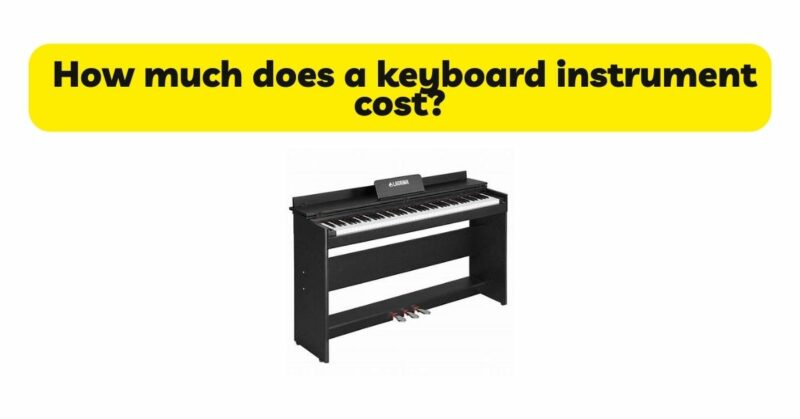The world of keyboard instruments encompasses a wide range of options, each with its own unique features, sound capabilities, and price points. Whether you’re a beginner, intermediate player, or professional musician, understanding the cost spectrum of keyboard instruments is crucial when considering a purchase. In this article, we will explore the various types of keyboard instruments and delve into their respective price ranges, allowing you to make an informed decision based on your musical needs and budget.
- Types of Keyboard Instruments: There are several types of keyboard instruments available, each with its own characteristics and price range. The most common keyboard instruments include:
a) Digital Keyboards: Digital keyboards are versatile instruments that offer a wide range of sounds, effects, and features. They often come with built-in speakers, a variety of instrument sounds, accompaniment styles, and connectivity options. Digital keyboards are typically more affordable than other keyboard instruments, with prices ranging from around $100 to $2,000 or more, depending on the brand, quality, and features.
b) Synthesizers: Synthesizers are powerful electronic instruments that allow for sound synthesis and manipulation. They offer extensive sound editing capabilities, customizable parameters, and advanced controls. Synthesizers come in various forms, including desktop modules, keyboard synths, and workstation synths. Prices for synthesizers can range from a few hundred dollars to several thousand dollars, depending on the complexity, sound quality, and features.
c) Stage Pianos: Stage pianos are designed to replicate the sound and feel of an acoustic piano in a portable and lightweight form. They typically offer a range of piano sounds, including grand, upright, and electric piano sounds, along with additional instrument sounds. Stage pianos can range in price from around $500 to $3,000 or more, depending on the brand, key action, sound quality, and features.
d) Workstation Keyboards: Workstation keyboards are all-in-one instruments that combine the functionalities of a keyboard, synthesizer, and sequencer. They offer extensive sound libraries, advanced editing capabilities, and recording features. Workstation keyboards are designed for professional musicians and music producers, with prices ranging from a few hundred dollars to several thousand dollars, depending on the brand, sound quality, and features.
e) Hybrid Pianos: Hybrid pianos combine the acoustic sound and feel of a traditional piano with digital technology. They typically feature a real piano action combined with digital sound processing, allowing for versatility and the ability to play silently with headphones. Hybrid pianos can be quite expensive, with prices starting from a few thousand dollars and ranging up to tens of thousands of dollars, depending on the brand, craftsmanship, and technology.
- Quality and Brand: The quality of a keyboard instrument, along with its brand reputation, can significantly impact its cost. Established and reputable brands often command higher prices due to their investment in research, development, and craftsmanship. These brands have a track record of producing reliable instruments with superior sound quality, durability, and customer support. However, lesser-known brands may offer more affordable options without compromising on quality.
- Key Action: The key action of a keyboard instrument refers to the mechanism by which the keys respond to touch. Higher-quality instruments often feature more advanced key action technology, such as weighted or graded hammer action, which closely replicates the feel of an acoustic piano. Instruments with better key action tend to be more expensive due to the precision engineering and materials used in their construction.
- Sound Quality and Features: The sound quality and features of a keyboard instrument play a significant role in determining its cost. Instruments with high-quality sound samples, realistic articulations, and advanced sound processing capabilities tend to be more expensive. Additional features such as built-in speakers, effects processors, recording capabilities, and connectivity options can also contribute to the overall cost of the instrument.
- Size and Portability: The size and portability of a keyboard instrument can impact its cost. Portable instruments that are designed for easy transportation and live performances tend to be more affordable than larger, more elaborate models. However, larger instruments may offer a more immersive playing experience and higher-quality sound, which can result in a higher price tag.
- New vs. Used Instruments: The choice between purchasing a new or used keyboard instrument can significantly affect its cost. New instruments often come with warranties, guarantees, and the assurance of quality, but they are generally more expensive. Used instruments can be more budget-friendly, but buyers should exercise caution, thoroughly inspect the instrument’s condition, and consider any potential repairs or maintenance costs.
- Accessories and Add-Ons: Consider the additional accessories and add-ons that may be required or desired with your keyboard instrument. This can include items such as a keyboard stand, bench, sustain pedal, headphones, carrying case, and music stand. These accessories may need to be factored into the overall cost of the instrument.
Conclusion: The cost of a keyboard instrument can vary significantly based on factors such as type, quality, brand, key action, sound quality, features, size, portability, new vs. used, and necessary accessories. Digital keyboards and entry-level instruments are generally more affordable, with prices ranging from around $100 to $2,000. As you move up the price spectrum, instruments such as synthesizers, stage pianos, workstation keyboards, and hybrid pianos can range from a few hundred dollars to tens of thousands of dollars. When considering a purchase, evaluate your musical needs, budget, and long-term aspirations to make an informed decision that strikes a balance between affordability and the desired features and quality. Remember, investing in a high-quality instrument that suits your musical goals will provide lasting enjoyment and support your growth as amusician. Research different options, read reviews, and consider trying out instruments in person to find the perfect keyboard instrument that fits both your musical aspirations and budget.


